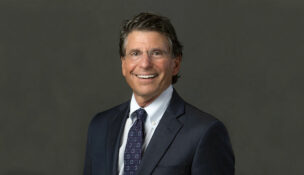Profits follow culture at Williams Mullen
115-year-old firm has diverse client roster
M.J. McAteer //November 29, 2024//

Williams Mullen’s commitment to clients, staff and community “will always underpin everything we do,” says the firm’s president, CEO and chairman, Woody Fowler. Photo by Matthew R.O. Brown

Williams Mullen’s commitment to clients, staff and community “will always underpin everything we do,” says the firm’s president, CEO and chairman, Woody Fowler. Photo by Matthew R.O. Brown
Profits follow culture at Williams Mullen
115-year-old firm has diverse client roster
M.J. McAteer //November 29, 2024//
Williams Mullen is having a good decade.
In the past 10 years, the Richmond law firm has seen its annual revenues swell from $106 million to $171 million and its annual profits have risen by 11.2%. What’s more, the firm’s president, CEO and chairman of the board, Calvin W. “Woody” Fowler Jr., is bullish on that growth continuing. He projects “north of $185 million” in revenues for the current fiscal year, ending Jan. 31.
Williams Mullen, with 260 attorneys on staff, about 70 of them hired within the past two-and-a-half years, is now the third largest law firm in the commonwealth, but it got off to a decidedly more modest start. Its origins reach back to 1909, when Lewis C. Williams and James Mullen decided to open a practice in Richmond aimed at helping local enterprises negotiate a changing regulatory environment. Four years later, when Congress further complicated life for businesses by instituting a federal income tax, many new clients came calling, and the firm was off and running.
In the 115 years since the firm’s namesakes first hung their shingle, Williams Mullen has evolved into a one-stop shop for the legal needs of a swath of clients, both corporate and private.
The firm has three core sections — Corporate, Litigation and Real Estate — and a host of specialized practices ranging from tax, employee benefits and immigration to intellectual property, energy, health care and government relations.
Its attorneys represent 4,000 clients across industries as varied as banking, senior living and industrial and manufacturing. Notable clients include the Virginia Alcoholic Beverage Control Authority, the state attorney general’s office, Atlantic Union Bank, TowneBank and Koch Industries.
The firm represented Sweet Briar College during its near dissolution 10 years ago, and among its current roster of local clients is Charlottesville-based Red Light Management Group, the music entertainment management group building the Allianz Amphitheater in Richmond.
Williams Mullen has been picking up increasing amounts of national and international work in recent years, but its focus remains resolutely regional, and it maintains offices in Richmond, Charlottesville, Norfolk and Tysons, as well as Raleigh, North Carolina, and Columbia, South Carolina. “We’re just as good as anyone and at a better value because we don’t have the overhead of big cities,” Fowler says.
Go-to for startups
In addition to serving long-established corporations, the law firm has become a favorite go-to for new enterprises, as well.
In 2020, for example, Richmond pharmaceutical startup Phlow, which landed a $354 million federal contract to help build a strategic national reserve of essential medications, turned to Williams Mullen for assistance.
Gregory R. Bishop, head of Williams Mullen’s 90-attorney corporate section, the firm’s largest practice group, helped shepherd Phlow’s 19,200-square-foot manufacturing operation in Petersburg through the approvals process needed to get it up and running in a speedy fashion. The facility opened this spring, and a second plant is in the works.
Entrepreneur Gary Warren turned to John M. Paris Jr., a partner at Williams Mullen, for advice when Warren was starting up his Virginia Beach health care tech company, ivWatch, in 2020.
“John knows the ins and outs of how to do it properly,” says Warren, who also cites the work of Williams Mullen partner Anne E. Domozick in helping to make ivWatch a reality. “They are good with all the corporate law stuff that is usually ignored by startups.”
Another notable entrepreneur who sings the law firm’s praises is Tom Walker, CEO of DroneUp, the high-profile, fast-growing Virginia Beach-based aerial drone services company.
Walker relied on the expertise of Paris and fellow Williams Mullen partners Thomas R. Frantz and David C. Burton to guide DroneUp in raising $23 million in private financing. The legal team also helped negotiate DroneUp’s partnership deal with Walmart on a pilot program providing last-mile drone delivery services.
“People have said time and again to get a bigger law firm, but there’s never been a time when the advice they gave wasn’t good,” Walker says of the trio of Williams Mullen lawyers. “I’d be hard-pressed to work with anyone else. They are top-notch.”
Triple commitment
Williams Mullen’s ability to provide clients with a high level of comprehensive services is the result, Fowler says, of an intentional strategy to build a collegial and supportive in-house culture aimed at attracting, developing and retaining talented lawyers. “We take care of our people,” he says.
As proof, Fowler notes that during the firm’s past two summer associate programs, the firm made 25 job offers and had 25 acceptances, something he calls “unprecedented. You usually predict you’re going to get 60% to 80% of the people you make offers to.”
The firm has developed a deep bench of “young leaders” and “young producers” in the 35- to 50-year-old demographic, says Fowler, adding, “We should be good for the next 25 years.”
Although turnover can be a fact of life at many law firms, Williams Mullen lawyers tend to spend their entire careers there. Paris, for instance, has been with Williams Mullen more than 30 years and Bishop for 26. Fowler himself has been with Williams Mullen for almost 34 years, spending the past 10 as CEO.
With just a mere decade at Williams Mullen, Jamie Baskerville Martin, head of the firm’s 13-member health care section, is a relative newbie who found herself pleasantly surprised by the firm’s culture. “We are not siloed, not separated. The sections are permeable,” she says. “The willingness of everyone to pitch in and work collaboratively has exceeded my expectations.”
Another big plus for Martin is that community service is baked into Williams Mullen’s DNA. On day one, Bishop says, new hires are asked what community organizations stir their passions and are told that Williams Mullen will get behind whatever cause moves them.
In Martin’s case, that has meant donating pro bono hours to nonprofits providing care to people who otherwise would fall by the wayside. For Bishop, the cause is multiple sclerosis, because a close family member was diagnosed with the disease back when he was a young associate at the firm. Since then, he has donated many hours to working for the National Multiple Sclerosis Society. He has also served on its board and put together a Williams Mullen bike team that raised more than $40,000 for the cause.
In all, Williams Mullen supports more than 200 organizations through a combination of leadership, service, pro bono work and contributions from the Williams Mullen Foundation, which has donated more than $1 million to local, regional and national nonprofits during the past five years.
While technology and generations might change, Williams Mullen’s formula for success — a triple commitment to its clients, staff and community — won’t, says Fowler: “That philosophy will always underpin everything we do.”
t

















